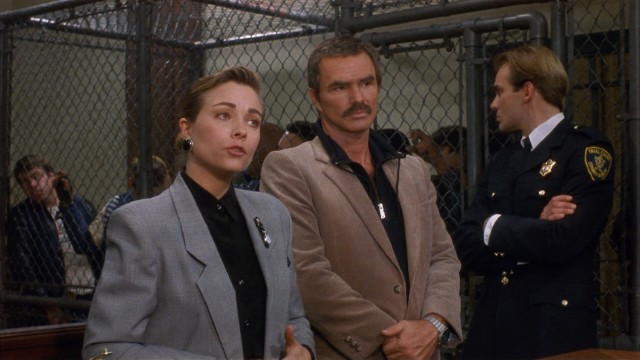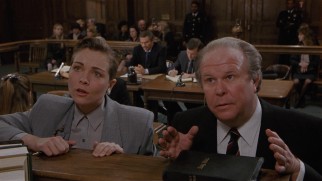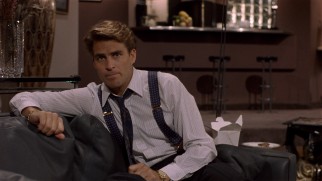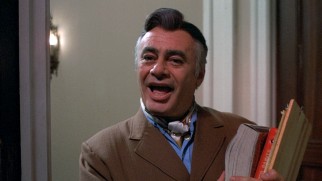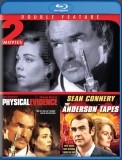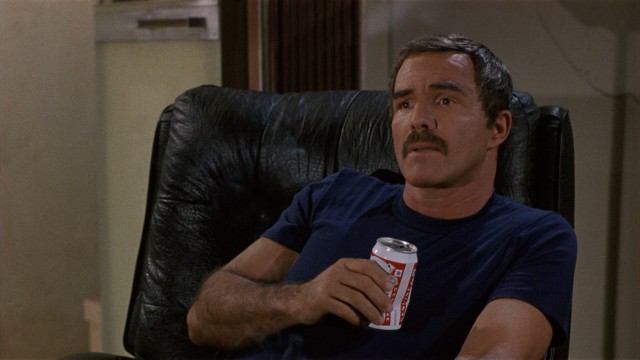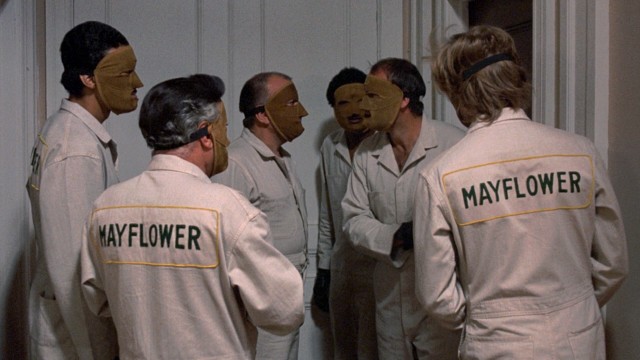Physical Evidence & The Anderson Tapes: Double Feature Blu-ray Review
 |
Physical Evidence
Theatrical Release: January 27, 1989 / Running Time: 99 Minutes / Rating: R Director: Michael Crichton / Writers: Bill Phillips (story & screenplay); Steve Ransohoff (story) Cast: Burt Reynolds (Joe Paris), Theresa Russell (Jenny Hudson), Ned Beatty (James Nicks), Kay Lenz (Deborah Quinn), Ted McGinley (Kyle), Tom O'Brien (Matt Farley), Kenneth Welsh (Harry Norton), Ray Baker (Strickler), Ken James (Hank Carruth), Michael P. Moran (Tony Reugger), Angelo Rizacos (Tony Sklar), Lamar Jackson (Delmar Fraser), Paul Hubbard (Burt Knight), Larry Reynolds (Trial Judge), Peter MacNeill (Brannigan), Laurie Paton (Mabel), Don Granbery (Vincent Quinn) |
 |
The Anderson Tapes
Theatrical Release: June 17, 1971 / Running Time: 99 Minutes / Rating: Not Rated (Originally: GP) Director: Sidney Lumet / Writers: Lawrence Sanders (novel); Frank R. Pierson (screenplay) Cast: Sean Connery (John "Duke" Anderson), Dyan Cannon (Ingrid Everleigh), Martin Balsam (Tommy Haskins), Ralph Meeker (Captain Delaney), Alan King (Pat Angelo), Christopher Walken (The Kid), Val Avery ("Socks" Parelli), Dick Williams (Edward Spencer), Garrett Morris (Sergeant Everson), Stan Gottlieb (William "Pop" Myer), Paul Benjamin (Jimmy), Anthony Holland (Psychologist), Richard B. Shull (Werner), Conrad Bain (Dr. Rubicoff), Margaret Hamilton (Miss Kaler), Judith Lowry (Mrs. Hathaway), Max Showalter (Bingham), Janet Ward (Mrs. Bingham), Scott Jacoby (Jerry Bingham), Norman Rose (Longene), Meg Myles (Mrs. Longene), John Call (O'Leary) |
Buy Physical Evidence & The Anderson Tapes Double Feature Blu-ray from Amazon.com
Little Minneapolis-based Mill Creek Entertainment continues to make the vast catalogs of Hollywood's big studios available on Blu-ray. This week sees the release of five more single-disc Double Feature Blu-rays of films Mill Creek licenses from Sony Pictures Home Entertainment. Burt Reynolds' career took off in the 1970s with a number of hit films. The 1980s found the actor complacent, willing to make the same kind of carefree action comedies again and again, including sequels to Cannonball Run and Smokey and the Bandit. Physical Evidence is a more serious action drama but it's also a Burt Reynolds vehicle which makes it less than edgy.
I've noticed that a lot of "grown-up" movies from the 1980s seem quaint today and that is true of this one. Though it earns its R rating with a touch of profanity and violence, there is the sense that this isn't merely for adults, but older adults, the kind that watch Jesse Stone movies on CBS nowadays and would follow Reynolds from his then-current TV gig, the short-lived ABC mystery "B.L. Stryker", to his next one, the CBS sitcom "Evening Shade." Then in his early fifties, Reynolds had been around long enough for fans to grow old with him. Those fans must have been part of the audience courted by this generically-titled murder mystery released at the end of January 1989 across from the flashier Nick Nolte/Martin Short PG-13 action comedy Three Fugitives.
Reynolds plays Joe Paris, a Boston police officer on suspension for excessive force. The prologue shows a suicidal young man inadvertently turn into a bungee jumper when he discovers a dead body on the bridge from which he is to plunge. The corpse is that of Jake Farley, a bar owner and police informant. Many might want to have offed Farley, but the suspicion lands on Paris, who has a bloody head and no recollection of the previous night, but assumes he passed out drunk as he is wont to.
Tired of trivial trials, young public defender Jennifer Hudson (Theresa Russell) campaigns for the chance to represent Paris and is assigned the case. District attorney James Nicks (Ned Beatty) is convinced of Paris' guilt. Hudson has little doubt as well, as her client's alibi changes from an indebted bartender to a married woman widower Joe has occasionally romanced. Paris' temper and Vietnam War record also make him uniquely qualified for slitting Farley's throat. For his part, Paris maintains that he is being framed, possibly by Farley's own son who has quickly assumed ownership of the family bar. To her supervisor's concern, Hudson resists an offer to plead the case down to second degree murder in a deal that would have Joe out of jail in three years.
Physical Evidence is the final directing credit of best-selling novelist Michael Crichton, then on the verge of beginning his most successful decade with creations like Jurassic Park, "ER", and Twister. Physical is also the only film Crichton ever directed but did not write. Christine adapter Bill Phillips penned the screenplay and shares story credit with novice Steve Ransoshoff. For a good indication of the writing quality, you'll notice that Phillips went on to spend the 1990s entirely writing TV movies, including a number of Jack Reed mysteries directed, starring, and co-written by Brian Dennehy. Ransoshoff, meanwhile, has never written again, soon after moving to independent film financing, a line of work he remains in.
The film manages to hold your attention despite generally poor acting. The cast includes '80s sitcom-killer Ted McGinley (soon to find a long-term home on "Married...with Children") as Jenny's wealthy junk bond trader fiancé. But it's mostly a showcase for the two actors above the title: Reynolds and Russell. Just turned 30, the latter actress had been around since Elia Kazan's The Last Tycoon (1976) and, after years of working with director Nicolas Roeg (a significantly older Englishman she would marry), was seemingly a viable leading lady. Conceived as a sequel to 1985's Jagged Edge, whose connection via producer Martin Ransohoff (father of Steve) was emphasized in the marketing, Physical Evidence does feel like a movie that might have preempted "Matlock" one week. It flirts with a romance between its two leads, whom twenty-one years separate. Its conspiracy design allows it to pin the crime on any introduced character without much rhyme or reason (a tactic it uses to little satisfaction). All the legal wrangling ultimately goes nowhere, as the courtroom aspect is dropped well before the climax. Though nothing spectacular or terribly memorable, I would say it's slightly better than the lowly 5.0 average rating it holds on IMDb, where only 736 users have rated it to date.
Sean Connery had been reluctant to commit to a series, but James Bond would elevate him to international fame. Still, the actor decided he had gotten his fill over the course of five films and relinquished the role after 1967's You Only Live Twice. With the role vacant again after one outing starring Australia's George Lazenby, Connery would return to 007 in 1971, but not before bringing his Bond cachet to other lead roles like the titular turn in The Anderson Tapes.
Adapted by Frank Pearson (Cool Hand Luke, Dog Day Afternoon) from Lawrence Sanders' best-selling 1970 novel of the same name, this film opens with veteran safe-cracker John "Duke" Anderson (Connery, getting to use his native Scottish accent) being released from prison after serving ten years. The sentence has hardly reformed Anderson. He pays a visit to his girlfriend, Ingrid (Dyan Cannon), who is described by one of her clients as a "four-bit hooker." That calling has evidently provided for Ingrid because Anderson quickly picks her ritzy East 91st Street apartment building as the target of a comeback heist.
Anderson rounds up a crew that includes camp gay decorator Tommy (Martin Balsam) as a "bird dog" and a young black pauper (Dick Anthony Williams) as a driver. There are even roles for the two convicts who left jail alongside Anderson: Pop (Stan Gottlieb), an old man who had been locked up since 1931, and "The Kid" (a baby-faced Christopher Walken, earning an "Introducing" credit in one of his first films). The robbery is reluctantly bankrolled by a big-time criminal (Alan King) to whom the job is chump change and who insists that a sloppy colleague can participate and be killed in the action.
On Labor Day weekend, the men rent a Mayflower moving truck (which houses a getaway van within) and don masks as they attempt to rob only the worthwhile valuables from the building's six flats. Among the actors portraying the residents are some famous faces from cinema's past and television future: The Wizard of Oz's Margaret Hamilton and "Diff'rent Strokes" patriarch Conrad Bain. Anderson rationalizes his lifestyle as such: the victims get some excitement and a story to tell, the insurance companies get free publicity, and the police, their need proven, should get a raise.
All the while, Anderson and his accomplices are under surveillance by various authorities. You might assume that is important based on the title, the amount of time devoted to scenes depicting such activity, and the prominent music cues attached to those moments. In fact, though, that angle could be lost with virtually no impact on the film.
The Anderson Tapes is directed by the great Sidney Lumet, who shot this on location in his native New York City. You would think Lumet was destined to become cinema royalty after his tremendous film debut, 1957's 12 Angry Men. But after more than a decade of films generally regarded middling to poor, Lumet was about to return to reverence with a high-profile stretch of hard-hitting drama, including Serpico, Dog Day Afternoon, and Network. Anderson seems like decent preparation for such immortal works, but the caper could not have been too challenging for Lumet and Connery, collaborating for the second of five times.
Anderson is easygoing but engaging, reminding one of Ocean's Eleven a decade after the original and thirty years prior to the remake. Lumet's film is not nearly as relaxed as the Rat Pack's version nor is it comedic and stylish like Steven Soderbergh's franchise launcher. Still, Anderson does get good use of nonlinear editing and cross-cutting, techniques used sparingly in the past.
A product of its time, it is situated between old-fashioned clear-cut crime dramas and the more mature, complex ones soon to come. Its near-violence, near-profanity, and near-nudity make it feel like the broadcast TV version of a grittier film, Arguably the most distinctive feature of this somewhat forgotten film is the bizarre and dated but fun electronic score by musician and icon Quincy Jones. At times, it seems like the sound effects of a 1950s sci-fi B-movie have been accidentally dropped in here, as Jones punctuates every bit of incriminating surveillance with harsh chords you associate with laser beams.
The IMDb's Trivia page adds another claim to fame, identifying this film as the first in which Sean Connery did away his toupee, accepting evidence of balding as the 40-year-old man he was during filming.
VIDEO and AUDIO Both films are presented in 1.78:1, approximating their original widescreen theatrical aspect ratios, and look quite good. Each features a tiny bit of minor debris, but an otherwise clean element and a nice amount of detail. Each still looks its age. For Anderson Tapes, that means a somewhat unbecoming '70s color palette. For Physical Evidence, there are some scenes with heavy grain. In short, the video quality for each could be a little better but will likely satisfy those watching on decent-sized HDTVs.
Satisfaction is also had in each film's 2.0 DTS-HD master audio soundtrack, Quincy Jones' jarring, divisive Anderson score notwithstanding. Dialogue stays crisp and clean, volume levels are stable, and each film's dated music is competently distributed. Each film also gets English SDH subtitles, Physical's mostly all-caps and Anderson's a mixed case. Anderson alone also is treated to French subtitles and Dolby 2.0 dub. BONUS FEATURES, MENUS, PACKAGING and DESIGN Neither film gets any bonus features on this Blu-ray.
The animated main menu plays screen-filling clips and score based on what title is highlighted, switching almost seamlessly between the two as you navigate. Only when you choose to play one of the movies can you select scenes and set up viewing options using a pop-up menu. Unfortunately, the disc not only doesn't support bookmarks, but also fails to resume unfinished playback the way that past Mill Creek discs have. As expected from the low list price, the side-snapped keepcase doesn't feature any inserts, reverse side artwork, or slipcover. A portion of the disc's label even goes to promoting the studio's official shop. All of that is forgivable because Mill Creek utilizes the rear cover to display ample and mostly accurate information for each movie.
CLOSING THOUGHTS DVD collectors long ragged on Mill Creek for overpacked, underwhelming presentations, but I like what the studio is doing on Blu-ray, maintaining a respectable level of quality at just about the lowest price imaginable. Though, I don't know how or why they are doing it while all the big studios just continue to sit on their catalogs, Blu-ray enthusiasts ought to take notice and give them some business when interested. The Anderson Tapes and Physical Evidence are worthy of some interest. The former is a fairly well-known entry to the paranoid 1970s thriller boom, while the latter is an okay but forgettable late '80s Burt Reynolds mystery. Both films sport fine hi-def presentations. The only real DVD casualty is Anderson's missing trailer. At its low list price (which is $20 lower than Amazon currently claims), this disc is a good value for fans of either film. Buy Physical Evidence & The Anderson Tapes: Double Feature Blu-ray at Amazon.com
|
Related Reviews:
DVDizzy.com | DVD and Blu-ray Reviews | New and Upcoming DVD & Blu-ray Schedule | Upcoming Cover Art | Search This Site
Directed by Sidney Lumet: Deathtrap • The Verdict | New: Ship of Fools & Lilith • Jack Reacher
Sean Connery: Indiana Jones and the Last Crusade • James Bond Blu-ray Collection, Volumes 1 and 2 • Darby O'Gill and the Little People
Christopher Walken: Seven Psychopaths • Catch Me If You Can • $5 a Day • Heaven's Gate • Kill the Irishman
Martin Balsam: A Thousand Clowns | Theresa Russell: Spider-Man 3 | Ned Beatty: ˇAlambrista! • Captain America (1990)
1970s: The Conversation • One Flew Over the Cuckoo's Nest • The Rookies: The Complete Second Season • The Last Hard Men & Sky Riders
1980s: New York Stories • Blaze • The Murder of Mary Phagan • Cohen & Tate • The Last Temptation of Christ
Capers and Mysteries: Ocean's Thirteen • Argo • Jackie Brown • Bottle Rocket • Jesse Stone: No Remorse • No Deposit, No Return
